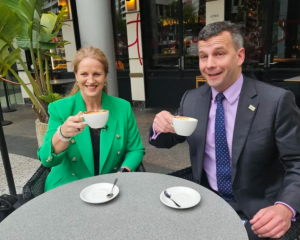CU South chief executive Tania Dickie expects the year to get even busier as she continues to push growth in a "trades package'' aimed at young trades people starting their careers.
Trades people established the first credit unions in New Zealand, with large factories and ports having their own credit unions at one stage, she said.
To return to those foundations, a business development manager was being appointed in Christchurch to work with the younger trades people.
So far, the strategy was working, with the loan book now more than $110 million compared with $90 million at the end of June.
"We are putting a lot of work into our loan-book growth. Better interest income is available to fund new activities.''
It was important to get young members involved in the credit union.
The number of "Gen-Y'' members was measured each month.
"If we don't attract those people and understand their needs, we cannot help them through their life cycle of buying cars, houses and saving.''
The credit union had retained long-term members but had not attracted a generation of people to use credit union services.
As part of the trades package, the credit union sponsored a "TradesQual'' programme in Southland that oversaw the graduation of apprentices.
That put the credit union in front of young people entering the workforce and included a wide range of young people from builders and plumbers through to mechanics, Ms Dickie said.
She was meeting business leaders in Otago to try to extend the credit union's involvement with trades apprentices.
The credit union needed to gain recognition as a viable alternative to banks.
"People understand where we fit in the market. We recognise we are not the same as banks. We can't deliver the same as banks. We are a $130 million credit union compared with a $2.5 billion bank. But we are an alternative.''
The credit union needed to be part of the community and supported organisations such as Foodshare, in Dunedin, and next month would announce three $5000 scholarships.
However, the credit union had to compete in the financial market while maintaining the values and ideals for which it stood, Ms Dickie said.
The credit union offered competitive pricing on loans but also concentrated on helping members with money management.
Personal loans had been the mainstay of lending growth but the credit union now offered home loans for first-home buyers - something it had not been able to do in the past.
As a keen supporter of KiwiSaver, the credit union could help members use their savings to get deposits for their first home.
Not all of those members were young.
Some members had waited a long time to buy their first home, she said.
Another possible growth area was lending to small businesses, hopefully soon, if legislation before Parliament was passed this year.
Now, the credit union could only lend to individuals.
The legislation would restrict credit union lending to businesses employing fewer than 19 people but would still be a good step for growth, Ms Dickie said.
The credit union would aim at those starting off in business, sole operators and people interested in buying franchises.
Credit Union South encompassed all of the South Island with the head office in Dunedin.
Ms Dickie said many people still did not know the head office was based in the city, attracting a "good group of people'' to come to Dunedin to work and stay for a long time.
At a glance
• First New Zealand credit union to have approved a securitisation facility with Westpac.
• Record profit of $643,000 in year to June.
• Achieved 20% growth in loan book in six months to December.
• First New Zealand credit union to have a product disclosure statement in the market.












